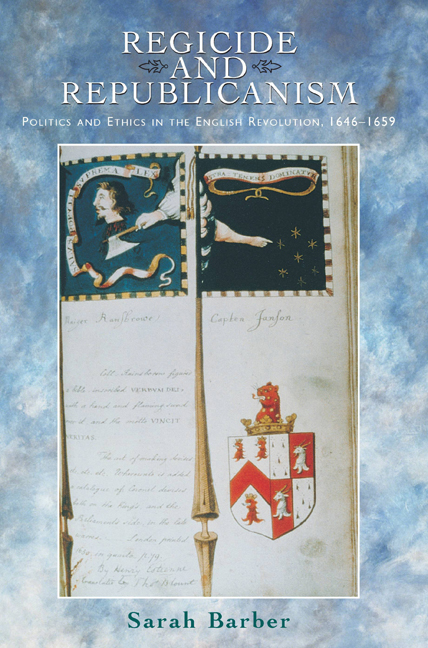Book contents
- Frontmatter
- Contents
- Preface
- List of Abbreviations
- Introduction: Regicide and Republicanism
- 1 Unparliamentary Language and the Dignity of the Crown
- 2 ‘A Mere Man’: Charles Levelled
- 3 The Expense of Blood and Treasure
- 4 King Ahab
- 5 Queen Justice
- 6 Government New Modelled?
- 7 The Engagement of Loyalty
- 8 The Active and the Passive Life
- Epilogue: The Good Old Cause
- Select Bibliography of Printed Sources
- Index
1 - Unparliamentary Language and the Dignity of the Crown
Published online by Cambridge University Press: 03 October 2020
- Frontmatter
- Contents
- Preface
- List of Abbreviations
- Introduction: Regicide and Republicanism
- 1 Unparliamentary Language and the Dignity of the Crown
- 2 ‘A Mere Man’: Charles Levelled
- 3 The Expense of Blood and Treasure
- 4 King Ahab
- 5 Queen Justice
- 6 Government New Modelled?
- 7 The Engagement of Loyalty
- 8 The Active and the Passive Life
- Epilogue: The Good Old Cause
- Select Bibliography of Printed Sources
- Index
Summary
The defeat of the royalist forces at the battle of Naseby in June 1645 was the last set-piece battle on English soil of the first civil war. Following the battle, the parliamentarians seized a casket of letters, written by the king to his wife, Henrietta Maria, in which he solicited the military help of foreign Catholic powers. It was too late. The following September, the Earl of Montrose, leading the king’s Scottish troops, was defeated at Philiphaugh. As the war had seemed to drag on, the end when it came seemed swift and relatively bloodless. By April of1646, the ‘vanquished’ king raced to join the Scottish forces camped at Newark, where he surrendered two months later. The Scots were supposed to hold the king at Southwell, but instead took him north to their garrison in Newcastle, where news came of the collapse of the royalist stronghold of Oxford. The king was in the hands of the Scottish army, camped around Newcastle-upon-Tyne, when terms for a settlement were presented. They called upon Charles to sign the Solemn League and Covenant, suppress Catholicism and confirm ordinances made by the English Houses since the outbreak of war. The Houses would control the militia for the space of twenty years, after which time, the situation would be reviewed. A year later the Newcastle Propositions still formed the basis of the parliamentary overtures for peace.
Much has been made of the variety of views within the parliamentarian camp during the mid-1640s. The main division between those who were anxious to create terms for a treaty and those who wanted to push the conflict to a military solution — the peace and war parties — had given way to Presbyterians and Independents. The differences of opinion which grew out of the war were exacerbated rather than healed by the cessation of 1646. This chapter traces those from within the parliamentarian side who were most hostile to the prospect of making peace with the king and anxious to press for the maximum possible concessions from the defeated. We could call them the war party ultraists. They were nominally part of the Independent faction but hovered on its most extreme fringe.
- Type
- Chapter
- Information
- Regicide and RepublicanismPolitics and Ethics in the English Revolution, 1646–1659, pp. 11 - 39Publisher: Edinburgh University PressPrint publication year: 2020



